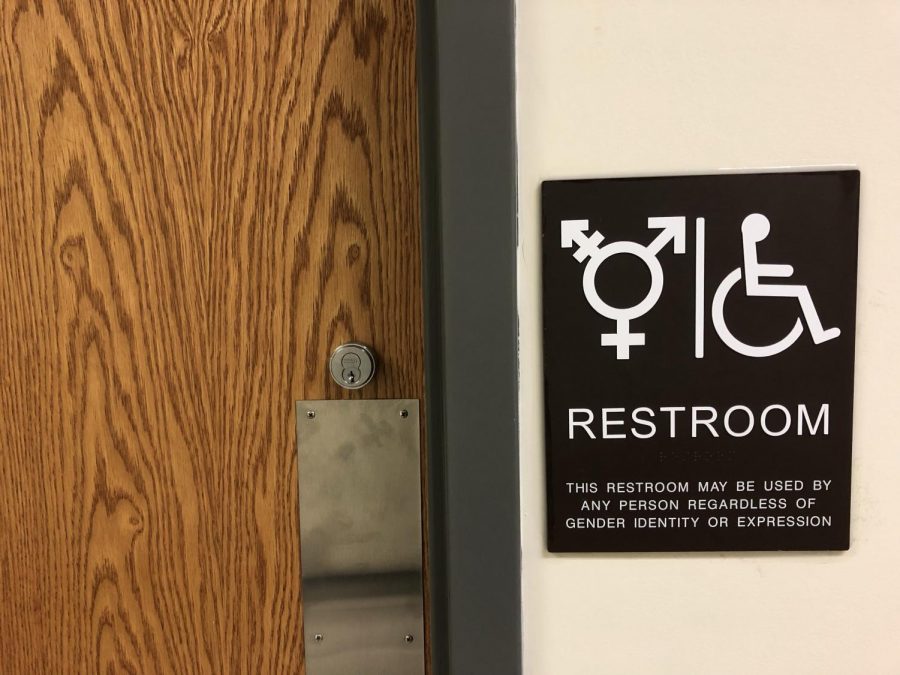President Trump’s Redefinition of Gender Sparks Concern on Moravian Campus
Gender neutral bathroom signs are featured throughout Moravian’s campus to welcome people regardless of their sexual identity.
Miles Molerio is a young, ambitious Moravian College student, with dreams of working in higher education. He is president of the College’s Spectrum, a mascot, a 26 Point Ambassador and a resident advisor. He’s also transgender and, he says, faces daily struggles because of it.
“I’ve been harrassed in the bathrooms, especially when I go into our new gender-inclusive multi-stall restroom. That’s happened twice already,” Molerio said. “Going to the doctor is rough. Having to out myself constantly to people who don’t need to know is a lot of mental stress. Just trying to live as a person is hard.”
Molerio’s struggles are not uncommon for people who are transgender or gender nonconforming.
Each day they face the burden of being treated as a spectacle. And with the White House’s proposal to redefine gender, students like Molerio say their existence could be erased if individual institutions, like Moravian College, do not work to create more inclusive spaces for those who do not function within the gender binary.
Because of an effort by the U.S. Department of Health and Public Services, gender would be considered a biological state, determined by genitals at birth, similar in definition to “sex.” Because those who are transgender and gender nonconforming do not feel that the sex they were born with matches their gender identity, they live outside the confines of a binary based on sex alone.
However, with the plans for a redefinition, the term “gender” will no longer be seen as something changeable; it is instead a concrete definition forced upon someone at birth with no room for gender expression.
With the news of this possible redefinition curriculating, Moravian College’s President, Bryon Grigsby, sent out an email to the campus in October, right after the proposal was made public, assuring them that although the federal government’s agenda seems discriminatory, the College will continue to uphold its values of inclusion.
“While we cannot control the larger social impact of the current administration’s decisions, we recognize our community’s responsibility to support all students, faculty, and staff,” said Grigsby in his email.
Gender nonconforming and trans students only make up roughly 1 percent of Moravian’s population, according to a survey conducted by Title IX director Leah Breisch. But they still require support from the faculty and administration at the school.
And although Grigsby’s email was in support of the community, it remains questionable to some whether it was supportive enough.
In his email, Grigsby listed the ways Moravian College supports trans and gender nonconforming students, giving “a gender inclusive restroom was identified on the first floor of the HUB” in August of 2018 as one of the examples.
“It’s hard as an ally to know what an affected community needs to hear, especially at a really critical time like this. It’s a very difficult task to be a spokesperson for the College,” said Moravian student Vaughn Tempesta about Grigsby’s email. “There’s a lot more to trans issues than public bathroom use, and generally that’s what I see when people advocate for the gender minorities.”
Tempesta is a senior and while he works diligently on his physics research, he also lives with the fear that people will misgender him and make assumptions about him based on a standard of masculinity set by society. As someone who is transgender, Tempesta says that being referred to by the wrong pronouns is always on the forefront of his mind.
“It’s going to affect anything legal: getting your driver’s license, registering to vote, applying to colleges, your bank account, buying a house, getting a car. Anything that has to do with legal documents is already an arduous process and expensive. So forcing this redefinition of what we even classify as gender is going to affect so much,” Tempesta said about the Trump administration’s proposal.
Among the suggestions that were made by students in the community on campus was to ask people in the LGBTQ+ community for input and to include a faculty member who could provide specific support on trans issues, rather than allowing faculty outside the LGBTQ+ community to be responsible for training.
“They could listen to their LGBT students when they try to help,” said Molerio. “[They should] listen to students’ initiatives as well as outside initiatives. Asking local LGBT centers to come in and do training [would help], because we don’t do external trainings. We have our own staff create a curriculum and then they do the training.”
Presently, the College has a Dean for Diversity, Equity, and Inclusion, Imaani El-Burki, in addition to Breisch, the Title IX coordinator, who handle matters of gender and sex-based discrimination.
The campus provides support through the Diversity, Equity, and Inclusion (DEI) House, gender-inclusive bathrooms and housing options, and events that promote trans visibility. The College is also working to create a Gender Identity Support plan for students who wish to have their pronouns and names changed, according to El-Burki.
“We’re ahead of the curve actually as it relates to our peer institutions,” El-Burki said. “We could always be doing more for any group and we will be doing more, but of all the groups on campus that require support from us, I would say the LGBTQ+ community has been receiving a good amount of support and attention.”
Em Adam is a senior at Moravian who is looking into graduate schools and weighing their options based on which school has the best veterinary program. But they are weighed down with the fear that they will be misgendered by admission counselors because Adam is gender nonconforming, despite the apparent perception that they are a woman.
When asked if the school is inclusive enough, Adam said, “Spectrum is really great. Adding gender-neutral bathrooms is fantastic. Gender-inclusive housing is also great, but I feel like there’s more we could do.”
Breisch says that the College can always improve and encourages students to talk to her if they have any suggestions.
“The one thing that I think is probably reassuring and a little bit of a solace to our students is that even if the federal government takes those protections away, as an institution, we remain committed to keeping all those particular classes as protected in our nondiscrimination policy for the campus,” said Breisch. “While we may not be about to make that change nationally or on a state level, we can make sure those protections stay in place at Moravian.”












